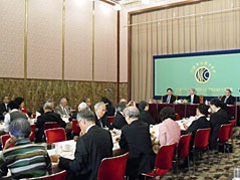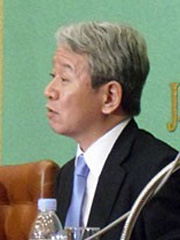- Home
- About JICA
- President's Desk
- Former President's Visits & Remarks
- TANAKA Akihiko
- President Tanaka Holds a Conference at the Japan National Press Club—What Is “Invigorating Assistance”?—
TANAKA Akihiko
July 13, 2012
President Tanaka Holds a Conference at the Japan National Press Club—What Is “Invigorating Assistance”?—
On June 13, JICA President Akihiko Tanaka held a press conference at the Japan National Press Club, where he explained the historical changes and current characteristics of Japanese ODA and JICA’s response to new development issues. He also discussed “invigorating assistance,” a concept he has stressed as important for the role that JICA should play.
Japanese assistance that meets the changes in the world
 Many media members gathered at the press conference
Many media members gathered at the press conference
At the beginning of his address, Tanaka provided an overview of Japanese ODA (official development assistance), which has undergone many transformations depending on the greatly changing circumstances of Japan since its start in 1954 as a part of post-war reparations. He said, "Japan, which managed a comeback in international relations, rapidly increased its ODA in the '70s and '80s and strengthened its contribution to the world economy through the back flow resulting from a trade surplus." He continued, “Since then, in the decade starting in 1991, Japan became the top donor in the world, and as calls were made for improved transparency and accountability in Japan and abroad, Japan’s ODA Charter, including its fundamental concept, were announced. Accompanying developments in globalization, Japan has strengthened its engagement with new issues since 2000, including peace-building, post-conflict assistance and climate change measures while advancing our cooperation with emerging donors.”
Concerning the characteristics of Japanese ODA, Tanaka said that ODA “is ‘assistance for self-help efforts’ based on Japan’s development experience,” and listed three approaches: “ownership” (respect for strong leadership and responsibility in the recipient country), “growth orientation” (building economic infrastructure and developing the private sector) and “capacity development” (absorption of new knowledge by the recipient nation)
JICA meeting new challenges
JICA is effectuating a transformation so as to provide assistance suited to the new development issues that are arising amid the great changes in the world’s societies and economic systems. As an example of suitable assistance, Tanaka mentioned “promoting ‘inclusive (comprehensive) development’ to correct disparities and inequality,” and he discussed the “importance of more people participating in the growth process with widespread equality and reaping the benefits in order to achieve poverty reduction through sustained economic growth.”
He also mentioned the emphasis that JICA has placed on “human security” to free people from fear and poverty and allow them to lead lives befitting human beings, how JICA has strengthened efforts to solving global issues such as climate change and infectious diseases, and that JICA has expanded aid to Africa and other areas in addition to Asia, the region where JICA traditionally focused on.
Assistance that invigorates the world and Japan
Tanaka explained his vision of “invigorating assistance” that he had cited as his goal since being installed in April in terms of four general perspectives. The first is “assistance to build peace.” He emphasized that while achieving peace involves warring countries disengaging from civil war and domestic strife, and places a value on providing “human security” for residents, peace and stability in the international community also contribute to Japan’s safety.
 Tanaka responds to a question from a media member
Tanaka responds to a question from a media member
The second perspective is “assistance to expand markets.” Tanaka explained how JICA is working to build widespread infrastructures to expand regional markets, including those in ASEAN countries and Eastern and Southern Africa, while giving consideration to correcting disparities and inequality. He explained that in advancing such projects, JICA has partnered with private Japanese companies, aiming for a win-win-win relationship among the developing countries, private companies and ODA.
The third perspective is “assistance to enhance knowledge.” Tanaka touched on the international collaborative research* being conducted by research agencies in Japan and developing countries toward solving global issues, and indicated the intention of further applying assistance methods to enhance knowledge in Japan and the developing countries. The fourth perspective is “assistance to widen the circle of friendship.” Tanaka advocated “measures such as receiving in Japan participants from developing countries, dispatching Japanese specialists and volunteers to developing countries, and South-South cooperation with partnerships between Japan and emerging donors to assist third countries as vital forms of cooperation that form a base for a sense of solidarity between the people in Japan and around the world.”
Building on this, Tanaka said, “Moving forward with assistance from these four perspectives will lead to living in harmony with the people of the world and the pursuit of an ‘enlightened self-interest’ that builds peace and prosperity, that is to say, ‘invigorating assistance.’” He also said, “Assistance is one part of foreign national strategy, and JICA cannot implement it alone. This strategy requires the cooperation of many partners, including government agencies, local governments, private businesses, non-governmental organizations and universities. We want to combine our strength with that of all such partners to invigorate the world as well as Japan.”
* The Science and Technology Research Partnership for Sustainable Development, or SATREPS. JICA works with its partners, the Japan Science and Technology Agency (JST) and research agencies and universities in developing countries, on collaborative research toward solving global issues pertaining to the environment, energy, disaster preparedness and infectious diseases.
- About JICA
- News & Features
- Countries & Regions
- Our Work
- Thematic Issues
- Types of Assistance
- Partnerships with Other Development Partners
- Climate Change / Environmental and Social Considerations
- Evaluations
- Compliance and Anti-corruption
- Science and Technology Cooperation on Global Issues
- Research
- JICA Development Studies Program / JICA Chair
- Support for the Acceptance of Foreign HRs / Multicultural and Inclusive Community
- Publications
- Investor Relations
